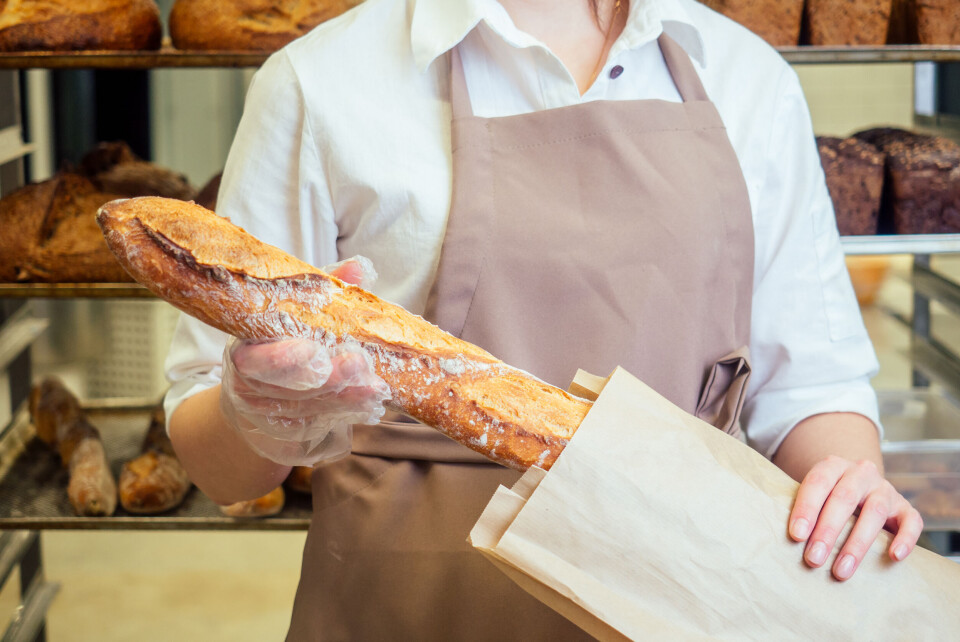-
Rugby vocabulary to know if watching the Six Nations in France
From un tampon to une cathédrale, understand the meaning of key French rugby terms
-
Exploring Pont-Croix: officially named as France’s best tourism village
A Breton gem boasting strong cultural heritage, charming architecture and vibrant local life
-
Duck Cold! Four French phrases to use when it is freezing outside
We remind you of French expressions to use to describe the drop in temperature
French ‘cannot tell a good baguette anymore’ says bread historian
Bakers are in crisis as French people no longer have a taste for good bread and the problem starts in schools

Emmanuel Macron rejoiced when Unesco added the ‘artisanal know-how and culture of baguette bread’ to its intangible cultural heritage list.
For the president, it is the recognition of a sacred French tradition. For historian Steven L. Kaplan, it is anything but.
Read more: French baguette-making practices added to Unesco intangible heritage
Loss of savoir-faire
Dr Kaplan literally wrote the book on French bread (several of them, in fact). Professor emeritus at Cornell, he even trained as a baker in 1969 to get closer to the object of his research.
“The irony is the baguette doesn’t stand for savoir-faire. In some ways, it stands for the loss of savoir-faire,” he told The Connexion.

Photo: Dr Steven L. Kaplan says a good baguette has spellbinding perfumes and a bouquet of tastes; Credit: Dr Steven L. Kaplan
The decision not to specify the baguette tradition, made according to strict guidelines, lumps this in with poor-quality breads and risks “undermining a long-term project” to return to traditional forms of baking, he says.
Bourgeoisie wanted fresh bread several times a day
To understand his concerns, it is necessary to go back to the birth of the baguette, in the early 20th century.
Bakers abandoned traditional loaves using levain (“It translates badly as ‘sourdough’, but it’s not sour – we’re not all San Francisco, thank goodness”), as these were too slow and taxing to make.
Baguettes, made using yeast instead of levain, replaced the heavy loaves.
Millers warned the key to the new practice was for the first fermentation to last three to four hours, but as early as the 1920s, this was being reduced to half an hour, Dr Kaplan said, with additives used to speed along the process.
“It was meant for the bourgeoisie who wanted fresh bread several times a day.”
Read more: Learn from the French: how to order the perfect baguette
The convenient white bread was tasteless
Taste, though, was already being sacrificed for convenience, and this would only get worse after World War Two.
“Bakers discovered that by kneading much more rapidly and intensely for a longer time, they could transform dark flour into a luminously white flour.
“That white bread was psychologically critical for the French, who associated whiteness with wellbeing, purity, and social recognition. It had only one flaw: it was tasteless.”
The last century has also seen an extended decline in the amount of bread French people consume, from 900g per person per day after the war, to 94g today, according to the National Confederation of French Bakeries and Pastry Shops (CNBPF).
Dr Kaplan says this change was due to structural factors – “access to a larger array of foods, increasing standards of living, mechanisation of activities which no longer required a huge amount of calories” – but not only.
“I argue they ate less bread because they didn’t like it!”
The baguette tradition returned to long fermentation
The turning point came in 1993 when, after seven years of negotiations with the industry, a government decree defined a new kind of baguette: the tradition.
The tradition in question does not refer to the first baguettes, but the older techniques baguettes replaced.
To call a baguette a tradition, bakers must not use freezing during the process, or additives such as vitamin C.
“You only have one choice: return to a long first fermentation. This is the only source of aroma and taste.
“It was an avowal they’d lost their way in terms of quality, and not navigated well the transition from a world in which bread was a vital necessity to a world where it’s a matter of pleasure.”
Read more: ‘A nice sheen’, ‘a honeycombed crumb’: France’s best baguette revealed
‘Unesco celebrates the toxic white baguette’
A good baguette, he says, has “spellbinding perfumes, a bouquet of tastes, a structure of the crumb that’s not white but pearly or cream, holes in the flesh of the crumb that are unevenly distributed”.
The white baguette, in contrast, “has a honeycomb structure, is habitually insufficiently baked and not crusty”.
Since Unesco was unable to recognise the tradition, as it is a product rather than a practice, it ended up celebrating the “toxic white baguette” this was meant to replace, Dr Kaplan said.
‘People cannot distinguish between good and mediocre bread’
The native Brooklynite, who divides his time between France and New York, previously worked as a consultant in the industry.
“There is a crisis of taste in France,” he said. “Even the wine industry has done a wonderful job of democratising good wine, of teaching people to distinguish between wines.
“Bakers have never achieved that pedagogical success.”
Still today, around 70% of people consume white baguettes, he claims.
“How do we account for the fact we have marvellous bread, and 70% continue to eat rubbish bread?
“If the answer was ‘it’s cheaper’, everyone would eat industrial bread. The truth is lots of people can no longer distinguish between mediocre and good bread.”
The problem starts in school canteens, he said, where children are served cheap rolls, and so do not grow up with an appreciation for bread.
Thousands of bakers will ‘go under’
There are still 33,000 bakeries in France today but many are struggling due to competition from supermarkets and bakery chains, and rising inflation.
“I think the crisis is objective and material, and also psychological, and will result in several thousand bakers going under in the next five years,”Dr Kaplan said.
“Many are in a tough place socially, saying ‘I’m busting my ass getting up at 1:00, working a long day’.
“This baker, now facing rising electricity or gas bills, will say to himself, if I’ve been making my own croissants, it’s finished. I’m going to cut corners, and my bread isn’t going to get any better.”
Related articles
RECIPES: bake a French baguette or sweet potato bread like a master
France’s mediaeval ‘bear hunt’ festivals added to Unesco heritage list
























